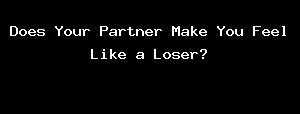profile/4236IMG_20200505_073400.jpg
Laytuah

Does Your Partner Make You Feel Like A Loser?
~3.8 mins read
You think of yourself as a reasonably competent person who can handle life’s challenges, even when those challenges sometimes seem insurmountable. You often feel that the more life throws your way, the better you can actually rise to the occasion. Indeed, in dealing with all the stresses caused by living through the COVID-19 pandemic, your abilities are being put to more of a test than ever. Yet, you somehow manage to get through each day by digging deep into your own resources.
There’s only one problem in all of this day-to-day testing of your reserves. It’s your partner, who seems to ready to step in with advice no matter how small the problem. In fact, your partner doesn’t even wait for you to ask for help before proffering some unwelcome observations about how to do this or that.
Perhaps you’re trying to put together a small stool that’s lost its legs. You know exactly how you plan to apply the glue and are just about ready to open the tube, when in walks your partner and scoffs at you for going about it entirely the wrong way (at least in your partner’s mind). Up until that moment, you were feeling pretty proud of yourself for having decided on a repair strategy, especially because you don’t normally go in for your own home repairs. With your partner’s derisive words ringing in your ears, you throw the whole thing away, your pride as broken as the stool.
What if the problem you’re trying to solve involves a deeper test of your abilities, knowledge, or maturity? Instead of your partner’s patronization of you becoming a small but potentially forgettable annoyance, you’ve now been questioned down to your core. According to a recent study by Jemma Hart and colleagues (2020) of Curtin University (Australia), seeing yourself as inadequate can form the root of a social comparison process that, in turn, can erode your mental health.
The “social rank†theory of depression, as noted by Hart et al., proposes that people develop this disorder when they fearrejection or exclusion due to their own inferiority. As they submit to the person who seems to hold an advantage over them, they sink further into feelings of vulnerability and inadequacy. At that point, questioning their basic abilities, they start to identify themselves as “losers.†unwanted observations would only tap into that stream of consciousness.
Turning to deeper-seated issues, what if you’re constantly focusing on the mistakes you’ve made in handling interpersonal situations? Maybe you don’t always say the right thing when you’re with family or friends. Even though you have the best of intentions, you might inadvertently let slip some remark that makes someone mad at you. Your partner, jumping on this situation, as in so many in the past, doesn’t fail to point out later just how dumb that remark was. “Let me handle it next time,†your partner announces, further deflating your confidence in your ability to iron out things out on your own.It is possible, of course, that your partner isn’t trying to undercut you, but just happens to be the type of person who wants to “help.†If this is the case, then you may be able to appeal to that altruistic sense by sharing your feelings. If not, then the Hart et al. findings suggest that you try to find other ways to turn down the inner voices of self-criticism, as difficult as this might be
You might also consider the role of fear of compassion in keeping you from letting your partner know exactly how you feel. If this person cares about you, despite appearing to try to make you feel small, it's possible that there may actually be more compassion in the emotional bank than you realize. If not, you may need to provide that compassion yourself to boost your own sense of competence and self-esteem
To sum up, healthy competition can sometimes stimulate people to achieve their best. It's important to recognize, however, when that competition gets in the way of your personal fulfillment.
https://www.psychologytoday.com/us/blog/fulfillment-any-age/202010/does-your-partner-make-you-feel-loser
Advertisement

Link socials
Matches
Loading...
